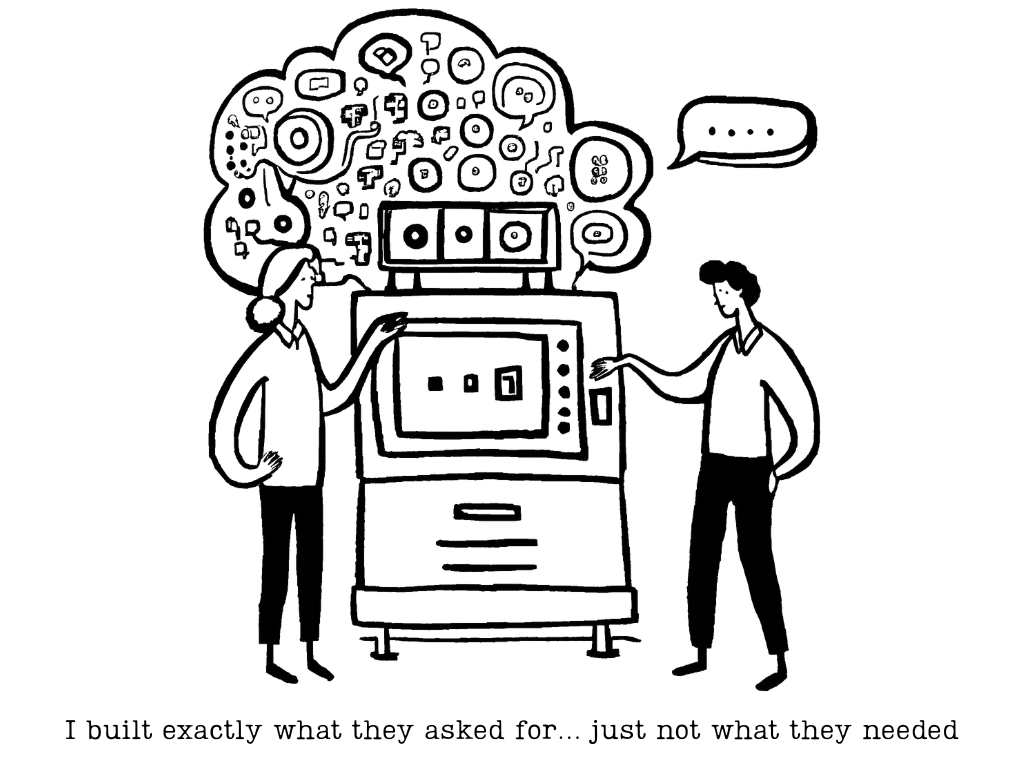As a founder who co-built a food photography app and now mentors early-stage startups, I've witnessed the same painful scenario play out repeatedly: passionate teams spending months building features nobody wants while the actual user problems remain unsolved.
The Startup Graveyard Is Full of Products Nobody Wanted
The statistics are sobering. CB Insights analyzed 111 startup failures and found that 42% cited "no market need" as the primary reason for their collapse. In other words, nearly half of these companies built something that didn't solve a real problem for their target users.
This isn't just about small startups, either. Even established companies make this mistake:
- Microsoft spent years and countless resources developing Windows Phone—a product that ultimately failed because they didn't sufficiently address what users actually wanted in the smartphone ecosystem.
- Google Glass launched to great fanfare but quickly fizzled when they discovered that real users had significant privacy and social acceptability concerns that weren't addressed in development.
- Quibi raised $1.75 billion but shut down after just six months because they fundamentally misunderstood how and when users wanted to consume short-form content.
The Multiplier Effect of Building the Wrong Features
The true cost of building the wrong features goes far beyond wasted development time. There's a devastating multiplier effect:
- Direct Development Costs: The obvious one—engineering hours, design resources, and management time all wasted on features that won't drive value.
- Opportunity Cost: While you're building the wrong features, you're not building the right ones. Your competitors might be.
- Market Window Closure: Markets evolve rapidly. By the time you realize you've built the wrong thing, the opportunity might be gone.
- Team Morale Impact: Nothing demoralizes a team faster than pouring their heart into features that users ignore or actively dislike.
- Funding Consequences: Investors want to see traction. Building the wrong features means burning runway without generating the metrics you need for your next round.
I experienced this firsthand with my food photography app. We initially built sophisticated editing tools because we thought they were cool. Six months later, we discovered that restaurant owners (our target users) didn't care about advanced editing—they wanted seamless menu integration and faster uploads. That misalignment cost us half a year of development and nearly killed our startup.

When Pivots Save Companies
The flip side? Some of today's most successful companies only found their way after talking to users and making dramatic pivots:
- Slack began as a gaming company called Tiny Speck. Only after speaking with users did they realize the internal communication tool they'd built for their team was more valuable than their game.
- Instagram started as Burbn, a complex check-in app with many features. User feedback led them to focus solely on photo sharing—the one feature people actually used.
- Twitter emerged from a podcasting platform called Odeo. When Apple launched iTunes podcasting, they spoke with users to find a new direction, leading to the creation of Twitter.
In each case, these founders could have stubbornly stuck to their original vision. Instead, they listened to users and changed course—saving their companies and creating billion-dollar businesses in the process.
The Research That Saves Months
You don't need massive user studies to avoid these pitfalls. Even brief, structured research can dramatically improve your odds of building the right thing:
When I mentor founders, I tell them that just 15-20 well-conducted user interviews can reveal 80% of your major usability issues and feature priorities. The trick is asking the right questions and truly listening to the answers.
The most revealing questions I've found are:
- "What was the hardest thing you did when trying to solve this problem?"
- "Tell me about the last time you encountered this problem."
- "What was hard about this?"
- "What did you do to solve this problem?"
- "What do you dislike about the solutions you've already tried?"
These questions uncover the real pain points, not just what users think they want. They reveal workarounds, frustrations, and the actual context in which your product will be used.
A Simple Framework: Are You Building What Users Actually Want?
After working with dozens of early-stage founders, I've developed a simple framework to determine if you're on the right track. It can be your "Reality Check Matrix." It has just four questions:
- Problem Validation: Can at least 8 out of 10 potential users clearly articulate the problem you're solving without you explaining it first?
- Solution Alignment: When you describe your solution, do users immediately connect it to their actual workflows or do they struggle to see how it fits?
- Enthusiasm Test: Do potential users ask when they can start using your product, or do they just politely nod?
- Payment Willingness: Would your target users be genuinely disappointed if your product disappeared tomorrow, enough to pay for it?
If you can't answer "yes" to at least three of these questions, you likely need more user research before committing significant resources to development.
The Founder's Dilemma
I know what you're thinking: "I don't have time for research. I need to build."
I felt the same way once. But I've learned that for every hour spent on good user research, you save 5-10 hours of development time down the road. It's the highest-leverage activity a founder can engage in.
The reality is that most founders are incredibly busy. You're juggling fundraising, team building, operations, and a dozen other priorities. Finding time to recruit users, conduct interviews, analyze findings, and translate them into product decisions is challenging.
But skipping this step is like trying to save time on a road trip by not looking at a map. You might move faster initially, but you'll likely end up very far from your destination.
For busy founders, there are options. You can:
- Dedicate just one day a week to speaking directly with users
- Train a team member to conduct research on your behalf
- Work with specialists who can handle the entire research process for you
Let Me Do the Research For You
I understand that as a busy founder, finding time for proper user research can feel impossible when you're already juggling fundraising, team building, and product development.
That's why I've created a specialized "Research Sprint" service for founders like you. Here's what it includes:
- Strategic recruitment of 15-20 ideal users for your specific challenges
- Expert-conducted problem interviews that go beyond surface-level feedback
- Comprehensive analysis identifying patterns, pain points, and opportunities
- Clear, actionable recommendations on feature prioritization
This service is designed to save you months of potential misdirection while giving you the confidence that you're building what users actually want.
To book an introductory session and learn more, visit https://cal.mentorcruise.com/christinapetushenko/intro-session-my-research-service-what-to-build-next. In just 80 minutes, we'll discuss your product, target users, and how my research service can help accelerate your path to product-market fit.
Whatever approach you choose, make user research a non-negotiable part of your product development process. The alternative—building in the dark—is far more expensive in the long run.
Your users have the answers. Are you ready to listen?







